Since the Covid-19 lockdown, online learning is all the rage. Leslie Bliss takes a look at what it has to offer those who wish to upskill from the comfort of their own home...
Everyone’s doing it. From toddlers to pensioners, all and sundry have embraced e-learning since the Covid-19 lockdown. Learning online is more accessible and enjoyable than ever.
As the entire country has been confined, video conferencing has suddenly become mainstream. Everyone is using it – Zoom, Facetime, Microsoft Teams, Skype and Cisco WebEx to name but a few – from the BBC with its daily government coronavirus press conferences to Have I Got News For You, as well as schools and universities.
Online education providers have been inundated since the lockdown as e-learning has come into its own, even for equestrians. No, you can’t beat practical experience, but there is a huge amount you can learn.
{"content":"PHA+QWZ0ZXIgYWxsLCBkaXN0YW5jZSBsZWFybmluZyBoYXMgYmVlbiBhcm91bmQgZm9yIGEgbG9uZyB0aW1lLCBvbmNlIHVwb24gYSB0aW1lIHJlbGlhbnQgb24gZ29vZCBvbGQtZmFzaGlvbmVkIFJveWFsIE1haWwuPC9wPgo8cD5CSFNJSSBKdWxpZSBCcmVnYSBmb3VuZGVkIFRoZSBPcGVuIENvbGxlZ2Ugb2YgRXF1aW5lIFN0dWRpZXMgKFRPQ0VTKSBzb21lIDMyIHllYXJzIGFnbywgb2ZmZXJpbmcgd2hhdCB3ZXJlIHRoZW4gY2FsbGVkIGNvcnJlc3BvbmRlbmNlIGNvdXJzZXMuPC9wPgo8cD48ZGl2IGNsYXNzPSJhZC1jb250YWluZXIgYWQtY29udGFpbmVyLS1tb2JpbGUiPjxkaXYgaWQ9InBvc3QtaW5saW5lLTIiIGNsYXNzPSJpcGMtYWR2ZXJ0Ij48L2Rpdj48L2Rpdj48c2VjdGlvbiBpZD0iZW1iZWRfY29kZS0zMSIgY2xhc3M9ImhpZGRlbi1tZCBoaWRkZW4tbGcgcy1jb250YWluZXIgc3RpY2t5LWFuY2hvciBoaWRlLXdpZGdldC10aXRsZSB3aWRnZXRfZW1iZWRfY29kZSBwcmVtaXVtX2lubGluZV8yIj48c2VjdGlvbiBjbGFzcz0icy1jb250YWluZXIgbGlzdGluZy0tc2luZ2xlIGxpc3RpbmctLXNpbmdsZS1zaGFyZXRocm91Z2ggaW1hZ2UtYXNwZWN0LWxhbmRzY2FwZSBkZWZhdWx0IHNoYXJldGhyb3VnaC1hZCBzaGFyZXRocm91Z2gtYWQtaGlkZGVuIj4NCiAgPGRpdiBjbGFzcz0icy1jb250YWluZXJfX2lubmVyIj4NCiAgICA8dWw+DQogICAgICA8bGkgaWQ9Im5hdGl2ZS1jb250ZW50LW1vYmlsZSIgY2xhc3M9Imxpc3RpbmctaXRlbSI+DQogICAgICA8L2xpPg0KICAgIDwvdWw+DQogIDwvZGl2Pg0KPC9zZWN0aW9uPjwvc2VjdGlvbj48L3A+CjxwPuKAnEkgd2FzIGZpbGxpbmcgYSBnYXAgaW4gdGhlIG1hcmtldC4gV2hpbGUgdHJhaW5pbmcgQnJpdGlzaCBIb3JzZSBTb2NpZXR5IChCSFMpIHN0dWRlbnRzIG9uIG15IHlhcmQsIEkgd2FzIHJ1bm5pbmcgZXZlbmluZyBjbGFzc2VzIGZvciB0aGVtLCBzZXR0aW5nIGhvbWV3b3JrLCBhbmQgaXQgcHJvZ3Jlc3NlZCBmcm9tIHRoZXJlLOKAnSBzaGUgc2F5cy48L3A+CjxwPlRoZSBjb2xsZWdlIGhhcyBjb21lIGEgbG9uZyB3YXkgc2luY2UgdGhlbiwgY2F0ZXJpbmcgZm9yIGNvbXBsZXRlIGJlZ2lubmVycyB0byB0aG9zZSBhaW1pbmcgZm9yIGEgZGVncmVlLWxldmVsIGRpcGxvbWEuIFRoZXJlIGFyZSAxMDAlLW9ubGluZSBjb3Vyc2VzLCBidXQgb3RoZXJzIHJlcXVpcmUgaGFuZHMtb24gZXhwZXJpZW5jZS4gRm9yIHRob3NlLCBUT0NFUyBjb21iaW5lcyBlLWxlYXJuaW5nIHdpdGggcHJhY3RpY2FsIHN0dWR5IHdlZWtzIGF0IGl0cyBuZXcsIHB1cnBvc2UtYnVpbHQgdHJhaW5pbmcgZmFjaWxpdHkgaW4gU3VmZm9say48L3A+CjxwPuKAnE91ciB5b3VuZ2VzdCBzdHVkZW50IGlzIDEzLCBvdXIgb2xkZXN0IDcyLCBhbmQgMjAlIGNvbWUgZnJvbSBhYnJvYWQuIFN0dWRlbnRzIGZseSBpbiBmcm9tIGFsbCBvdmVyIHRoZSB3b3JsZCBmb3IgdGhlIHN0dWR5IHdlZWtzIOKAkyBmcm9tIHRoZSBTaW5nYXBvcmUgVHVyZiBDbHViLCBIb25nIEtvbmcsIEZpbmxhbmQgYW5kIFNvdXRoIEFmcmljYS48L3A+CjxkaXYgY2xhc3M9ImFkLWNvbnRhaW5lciBhZC1jb250YWluZXItLW1vYmlsZSI+PGRpdiBpZD0icG9zdC1pbmxpbmUtMyIgY2xhc3M9ImlwYy1hZHZlcnQiPjwvZGl2PjwvZGl2Pgo8cD7igJxJdOKAmXMgYmVlbiBhIGJpZyBpbnZlc3RtZW50IHRvIHNldCB1cDsgaXQgdGFrZXMgYSBsb25nIHRpbWUgdG8gZGV2ZWxvcCBhIGJyZWFkdGggb2YgY291cnNlcy48L3A+CjxwPldlIGhhdmUgdGhlIGFkdmFudGFnZSB0aGF0IHdlIGNhbiB1c2UgdGhlIGJlc3QgZXhwZXJ0cyBmcm9tIGFyb3VuZCB0aGUgd29ybGQgdG8gY29udHJpYnV0ZSBhbmQgZGV2ZWxvcCB0aGUgcHJvZ3JhbW1lcy4gV2UgaGF2ZSBhIHRlYW0gb2YgYXJvdW5kIDIwIGFkdmlzZXJzLCB0dXRvcnMgYW5kIGxlY3R1cmVycy4gU3R1ZGVudHMgaGF2ZSB0aGVpciBvd24gY291cnNlIGFkdmlzZXIgZnJvbSB0aGUgb3V0c2V0LiBXZSB1c2UgTW9vZGxlIGFzIG91ciB2aXJ0dWFsIGxlYXJuaW5nIGVudmlyb25tZW50LiBJdCBwcm92aWRlcyBhY2Nlc3MgdG8gc3R1ZHkgZ3VpZGVzLCBwbGFubmVycywgd2ViaW5hcnMsIGFzc2lnbm1lbnRzIGFuZCB0dXRvciBmZWVkYmFjay4gVGhlcmXigJlzIGV2ZW4gYSB2aXJ0dWFsIGNvZmZlZSBzaG9wIHdoZXJlIHN0dWRlbnRzIGNhbiBzb2NpYWxpc2UuPC9wPgo8ZGl2IGNsYXNzPSJhZC1jb250YWluZXIgYWQtY29udGFpbmVyLS1tb2JpbGUiPjxkaXYgaWQ9InBvc3QtaW5saW5lLTQiIGNsYXNzPSJpcGMtYWR2ZXJ0Ij48L2Rpdj48L2Rpdj4KPHA+4oCcUHJvZ3JhbW1lcyBzdGFydCBhdCDCozc1IHVwIHRvIG91ciBtb3N0IGV4cGVuc2l2ZSwgd2hpY2ggaXMgYSBmb3VyLXllYXIsIGxldmVsIHNpeCBlcXVpbmUgcGh5c2lvdGhlcmFweSBkaXBsb21hLCB3aGljaCBpcyDCozUsMjUwIGFubnVhbGx5LCBpbmNsdWRpbmcgYWxsIHRoZSBzdHVkeSB3ZWVrcy4gVGhpcyBpcyBnb29kIHZhbHVlIGZvciBhIGRlZ3JlZS1sZXZlbCBwcm9ncmFtbWUs4oCdIHBvaW50cyBvdXQgSnVsaWUsIHdob3NlIHN0dWRlbnRzIGNob29zZSBlLWxlYXJuaW5nIG92ZXIgZnVsbC10aW1lIGNvbGxlZ2UgYW5kIHVuaXZlcnNpdHkgY291cnNlcyBhcyB0aGV5IGFyZSBsb29raW5nIHRvIGZpdCBzdHVkeSBhcm91bmQgb3RoZXIgY29tbWl0bWVudHMsIHN1Y2ggYXMgYSBqb2IsIGhvcnNlcyBhbmQgY2hpbGRyZW4uPC9wPgo8cD7igJxZb3UgY2FuIHRlYWNoIGFsbW9zdCBhbnl0aGluZyBvbmxpbmUsIGJ1dCB5b3UgZG8gbmVlZCB0byBoYW5kbGUgaG9yc2VzIGluIHJlYWwgbGlmZSwgd2hpY2ggaXMgd2h5IHdlIHByb3ZpZGUgYmxlbmRlZCBsZWFybmluZy4gRm9yIG91ciBDaXR5ICZhbXA7IEd1aWxkcyBlcXVpbmUgdmV0ZXJpbmFyeSBudXJzaW5nIGNvdXJzZSwgdGhlcmUgYXJlIG5pbmUgZGlmZmVyZW50IHN0dWR5IHdlZWtzIHRvIHRlYWNoIGFsbCB0aGUgY2xpbmljYWwgc2tpbGxzLOKAnSBzYXlzIEp1bGllLCB3aG9zZSBmb3JtZXIgc3R1ZGVudHMgaW5jbHVkZSBEciBTdGVwaGFuaWUgVmFsZW50aW4sIG5vdyBhIGxlY3R1cmVyIGluIHNwb3J0IGFuZCBleGVyY2lzZSBzY2llbmNlIGF0IHRoZSBVbml2ZXJzaXR5IG9mIHRoZSBXZXN0IG9mIFNjb3RsYW5kLjwvcD4KPGRpdiBjbGFzcz0iYWQtY29udGFpbmVyIGFkLWNvbnRhaW5lci0tbW9iaWxlIj48ZGl2IGlkPSJwb3N0LWlubGluZS01IiBjbGFzcz0iaXBjLWFkdmVydCI+PC9kaXY+PC9kaXY+CjxwPkJIUyBTdGFnZSA0IHNlbmlvciBjb2FjaCBhbmQgbmV1cm8tbGluZ3Vpc3RpYyBwcm9ncmFtbWluZyAoTkxQKSBtYXN0ZXIgcHJhY3RpdGlvbmVyIFNhcmFoIFRhbWUgd2FzIGluc3BpcmVkIHRvIHNldCB1cCBFcXVpbmUgRGlzdGFuY2UgTGVhcm5pbmcgKEVETCkgaW4gMjAxMCwgd2hpbGUgd29ya2luZyBhcyBhIGxlY3R1cmVyIGF0IE1lcnJpc3QgV29vZCBDb2xsZWdlIGluIFN1cnJleS48L3A+CjxwPuKAnFdlIGFyZSBhYm91dCBkZWxpdmVyaW5nIGNvcnJlY3QgaW5mb3JtYXRpb24gdG8gaG9yc2Ugb3duZXJzLiBXZSBhcmUgZ2VhcmVkIHRvd2FyZHMgaG9iYnkgcmlkZXJzLCBwZW9wbGUgd2hvIHdhbnQgdG8gbGVhcm4gdG8gZG8gdGhlIHJpZ2h0IHRoaW5nIGJ5IHRoZWlyIGhvcnNlLCBwZW9wbGUgd2hvIGFyZSB0aGlua2luZyBhYm91dCBidXlpbmcgYSBob3JzZSBhbmQgc29tZSB3aG8gYXJlIGxvb2tpbmcgZm9yIGEgc3RhcnRpbmcgcG9pbnQgZm9yIHRoZWlyIGVxdWVzdHJpYW4gY2FyZWVyLiBPdXIgYWltIGlzIHRvIGdpdmUgb3duZXJzIGNvbmZpZGVuY2Ugd2hpbGUgZW5qb3lpbmcgbGVhcm5pbmcgYWJvdXQgaG9yc2VzLOKAnSBzYXlzIFNhcmFoLCB3aG9zZSBjb21wYW55IHByb3ZpZGVzIDEwMCUgb25saW5lIHRyYWluaW5nIGJhc2VkIG9uIEJIUyBjb250ZW50IGFuZCB1cC10by1kYXRlIHJlc2VhcmNoIHdpdGggdGhlIGFzc2lzdGFuY2Ugb2YgYSBoYW5kZnVsIG9mIHR1dG9ycy48L3A+CjxwPuKAnFdlIGVuY291cmFnZSBzdHVkZW50cyB0byBmaW5pc2ggd2l0aGluIGEgeWVhciBhbmQgdHV0b3JzIGdpdmUgcmVndWxhciBmZWVkYmFjay4gRm9yIHNvbWUgb2YgdGhlIGNvdXJzZXMsIHN0dWRlbnRzIGNyZWF0ZSB2aWRlb3Mgb2YgdGhlbXNlbHZlcyBkb2luZyB0YXNrcywgd2hpY2ggd2UgdGhlbiBhc3Nlc3Ms4oCdIHNheXMgU2FyYWgsIHdobyBoYXMgZm91bmQgdGhhdCB0aGlzIHdheSBvZiBsZWFybmluZyBhcHBlYWxzIHBhcnRpY3VsYXJseSB0byB0aG9zZSB3aG8gYXJlIHNoeSBvciBuZXJ2b3VzLjwvcD4KPHA+UmVwZWF0IGJ1c2luZXNzIHNwZWFrcyBmb3IgaXRzZWxmIGFuZCBFREzigJlzIHRvcCBzdHVkZW50IG9mIDIwMTgsIE9saXZpYSBTYW5kZXJzLCBoYXMgY29tcGxldGVkIDExIGNvdXJzZXMgc3VjY2Vzc2Z1bGx5OiBjb21wZXRpdGlvbiBwc3ljaG9sb2d5LCB0aGUgZm9vdCBhbmQgc2hvZWluZywgaG9yc2UgaWRlbnRpZmljYXRpb24sIGhvcnNlIGhlYWx0aCwgd2ludGVyIGFpbG1lbnRzLCBjbGlwcGluZywgZXF1aW5lIGJlaGF2aW91ciBhbmQgcHN5Y2hvbG9neSwgZXF1aW5lIG51dHJpdGlvbiwgcmlkZSB3aXRoIGNvbmZpZGVuY2UsIGludHJvZHVjdGlvbiB0byBlcXVpbmUgbWFzc2FnZSBhbmQgQkhTIFN0YWdlIDEgcHJlcGFyYXRpb24gY291cnNlLjwvcD4KPHA+T2xpdmlhIHNheXM6IOKAnFRoZSBwcm9zIGFyZSB0aGF0IHlvdSBjYW4gY29tcGxldGUgY291cnNlcyBhdCB5b3VyIG93biBwYWNlLCBpbiB5b3VyIG93biB0aW1lLCB3aXRoIG5vIGRlYWRsaW5lcywgd2hpY2ggaXMgYSBiaWcgcGx1cyBmb3IgbWUgYXMgSSBhbSBkeXNsZXhpYy4gSSBoYWQgb25lLXRvLW9uZSBzdXBwb3J0IGZyb20gdGhlIGNvdXJzZSBkaXJlY3RvciBhbmQgdGhlcmUgaXMgYSBzZWN0aW9uIHdoZW4geW91IGFyZSBzdHVkeWluZyBwYXJ0aWN1bGFyIHN1YmplY3RzIG9ubGluZSB3aGVyZSB5b3UgYW5kIG90aGVyIHN0dWRlbnRzIGNhbiBwb3N0IHRob3VnaHRzLCB3aGljaCBpcyBncmVhdCBmb3IgZGlzY3Vzc2luZyBkaWZmZXJlbnQgc2l0dWF0aW9ucy4gSXTigJlzIGJvb3N0ZWQgbXkgY29uZmlkZW5jZS4gQWxzbywgdGhlIGNlcnRpZmljYXRlcyBidW1wIHVwIHRoZSBDViwgcGx1cyB5b3UgZG9u4oCZdCBoYXZlIHRvIG93biB5b3VyIG93biBob3JzZS48L3A+CjxwPuKAnFRoZSBjb25zIGFyZSB0aGF0IHlvdSBkb27igJl0IGhhdmUgZmFjZS10by1mYWNlIHNvY2lhbCBpbnRlcmFjdGlvbiBhbmQgaXQgY2FuIGJlIGhhcmRlciB0byBjb250YWN0IGEgY291cnNlIGRpcmVjdG9yIHRoYW4gaWYgeW91IHdlcmUgaW4gYSBjbGFzc3Jvb20uIEl0IGNhbiBhbHNvIGJlIGRpZmZpY3VsdCB0byBzdGF5IG1vdGl2YXRlZCBhbmQgaWdub3JlIGRpc3RyYWN0aW9ucyB3aGVuIHlvdSBhcmUgc3R1ZHlpbmcgYXQgaG9tZS4gSGF2aW5nIHNhaWQgdGhhdCwgSSB3b3VsZCByZWNvbW1lbmQgaXQgd2l0aG91dCBoZXNpdGF0aW9uLuKAnTwvcD4KPHA+QkhTQUkgUGF1bGEgQ2xlbWVudHMgc2V0IHVwIExpbmdmaWVsZCBFcXVpbmUgRGlzdGFuY2UgTGVhcm5pbmcgaW4gMTk5NiBhZnRlciBzaGUgZnJlcXVlbnRseSBmb3VuZCBoZXJzZWxmIHNwZW5kaW5nIGhhbGYgYW4gaG91ciBhdCB0aGUgZW5kIG9mIHJpZGluZyBsZXNzb25zIGdpdmluZyBoZXIgc3R1ZGVudHMgYWR2aWNlIHJlbGF0ZWQgdG8gaG9yc2UgY2FyZSBhbmQgbWFuYWdlbWVudC48L3A+CjxwPk5vdyB3aXRoIDIsMDAwIHN0dWRlbnRzIG9uIGhlciBib29rcyBhbmQgYSB0ZWFtIG9mIGZpdmUgdHV0b3JzLCBzaGUgYWdyZWVzIHdpdGggU2FyYWggdGhhdCBtb3RpdmF0aW9uIGlzIHRoZSBoYXJkZXN0IHBhcnQgb2YgZGlzdGFuY2UgbGVhcm5pbmcuIEl0IGlzIGdvb2QgdG8gaGF2ZSBhIHNldCBzcGFjZSB3aXRoIGEgdGFibGUgYW5kIGNoYWlyIHRvIHN0dWR5LCByYXRoZXIgdGhhbiBvbiB0aGUgY291Y2ggb3IgaW4gdGhlIGtpdGNoZW4gd2l0aCBsb3RzIG9mIGRpc3RyYWN0aW9ucyBhbmQgaW50ZXJydXB0aW9ucy4gRmluZCBhIHBsYWNlIG9mIHlvdXIgb3duLiBUdXJuIHRoZSBnYXJkZW4gc2hlZCBpbnRvIGEgc3R1ZHkuIFR1cm4gb2ZmIHlvdXIgcGhvbmUgdG8gYXZvaWQgc29jaWFsIG1lZGlhIGRpc3RyYWN0aW9uIOKAkyBtb2JpbGVzIGFyZSB1c3VhbGx5IG5vdCBhbGxvd2VkIGluIGNsYXNzcm9vbXMsIHNvIGF2b2lkIHRoZW0gd2l0aCBob21lIHN0dWR5LCB0b28uIE9ubHkgc3R1ZHkgZm9yIHNob3J0IHBlcmlvZHMsIHNvIHlvdSBsb29rIGZvcndhcmQgdG8gZ2V0dGluZyB5b3VyIGNvdXJzZXdvcmsgb3V0LjwvcD4KPGRpdiBjbGFzcz0iaW5qZWN0aW9uIj48L2Rpdj4KPHA+RS1sZWFybmluZyBpcyBtZXRhbW9ycGhvc2luZyBhdCBhbiBpbmNyZWRpYmxlIHJhdGUgYW5kIGVuYWJsZXMgdHVpdGlvbiBmcm9tIHNvbWUgb2YgdGhlIG1vc3QgcmVzcGVjdGVkIGluc3RydWN0b3JzIGluIHRoZSB3b3JsZCwgd2hlcmV2ZXIgeW91IGhhcHBlbiB0byBiZSBiYXNlZC4gSW4gMjAxNiwgRHJlc3NhZ2UgVHJhaW5pbmcgVFYg4oCTIFJpZGUgV2l0aCBZb3VyIE1pbmQgbGF1bmNoZWQgaW4gY29sbGFib3JhdGlvbiB3aXRoIE1hcnkgV2FubGVzcyBCSFNJLCBCU2MsIGZvciBleGFtcGxlLiBJdCBwcm92aWRlcyB2aWRlb3MsIGFydGljbGVzIGFuZCBsaXZlIHdlYmluYXJzIGNvdmVyaW5nIHN1YmplY3RzIGZyb20gcmlkZXIgYmlvbWVjaGFuaWNzIHRvIHRlc3QgcmlkaW5nLCB3aXRoIG1vbnRobHkgbWVtYmVyc2hpcCBmcm9tIMKjMTcuNTAuIE1hbnkgY29hY2hlcyBoYXZlIHN0YXJ0ZWQgZ2l2aW5nIGxlc3NvbnMgb25saW5lIGR1cmluZyB0aGUgbG9ja2Rvd24sIHRvbywgbmVnYXRpbmcgdHJhdmVsIHRpbWUgYW5kIGNvc3RzLiBJdCBjZXJ0YWlubHkgb3BlbnMgdXAgYSB3aG9sZSBuZXcgd29ybGQgb2YgbGVhcm5pbmcuPC9wPgo8aDM+UXVlc3Rpb25zIHRvIGFzayBiZWZvcmUgeW91IHNpZ24gdXA8L2gzPgo8cD5XaXRoIHN1Y2ggYSBodWdlIHZhcmlldHkgb2Ygb25saW5lIGNvdXJzZXMsIGl04oCZcyB3b3J0aCBjb25zaWRlcmluZyBhIGZldyBxdWVzdGlvbnMgdG8gbWFrZSBzdXJlIHlvdSBjaG9vc2UgdGhlIHJpZ2h0IG9uZTo8L3A+CjxvbD4KPGxpPkRvZXMgdGhlIGNvbXBhbnnigJlzIHdlYnNpdGUgaGF2ZSB0aGUgcmlnaHQgdG9uZSBhbmQgZmVlbCBmb3IgeW91PzwvbGk+CjxsaT5XaG8gZm91bmRlZCB0aGUgY29tcGFueSwgd2hlbiwgd2h5IGFuZCB3aGF0IGFyZSB0aGVpciBxdWFsaWZpY2F0aW9ucz88L2xpPgo8bGk+V2hvIGlzIHRoZSBjb3Vyc2V3b3JrIHdyaXR0ZW4gYnkgYW5kIHdoYXQgYXJlIHRoZWlyIGNyZWRlbnRpYWxzPzwvbGk+CjxsaT5JcyB0aGUgY291cnNlIGJhc2VkIG9uIGEgcmVjb2duaXNlZCB0cmFpbmluZyBzeXN0ZW0\/PC9saT4KPGxpPldoYXQgaXMgeW91ciBhaW07IHdpbGwgdGhlIGNvdXJzZSBwcm92aWRlIHlvdSB3aXRoIHRoZSBxdWFsaWZpY2F0aW9uIHlvdSB3YW50PyBBcmUgeW91IGxvb2tpbmcgdG8gaW5jcmVhc2UgeW91ciBrbm93bGVkZ2UgaW4gYSBzcGVjaWZpYyBhcmVhLCBwcmVwYXJlIGZvciBCSFMgZXhhbXMgb3IgZ2FpbiBhIHJlY29nbmlzZWQgcXVhbGlmaWNhdGlvbj88L2xpPgo8bGk+SG93IGlzIHRoZSBjb3Vyc2V3b3JrIHByb3ZpZGVkPyBTb21lIGNvbXBhbmllcyBzZW5kIHlvdSBQREZzIHRvIHByaW50IGF0IGhvbWUsIG90aGVycyB1c2Ugc29waGlzdGljYXRlZCBiZXNwb2tlIGVkdWNhdGlvbmFsIHBsYXRmb3JtcyBmb3IgeW91IHRvIGFjY2VzcyBpdCB1c2luZyBhIHZhcmlldHkgb2YgZm9ybWF0cywgaW5jbHVkaW5nIHZpZGVvcyBhbmQgaW50ZXJhY3RpdmUsIGxpdmUgd2ViaW5hcnMuIEV2ZXJ5b25lIGxlYXJucyBkaWZmZXJlbnRseSwgc28gY29uc2lkZXIgaG93IHlvdSBlbmpveSBzdHVkeWluZy48L2xpPgo8bGk+V2hhdCBpcyB0aGUgcGFzcyByYXRlPyBJdCB3aWxsIHZhcnkgZnJvbSBjb3Vyc2UgdG8gY291cnNlLjwvbGk+CjxsaT5Ib3cgbXVjaCBzdXBwb3J0IGFuZCBmZWVkYmFjayBhcmUgcHJvdmlkZWQ\/PC9saT4KPGxpPkNoZWNrIG91dCBhbnkgdGltZSBmcmFtZXMuIFRoZSBiZWF1dHkgb2YgZS1jb3Vyc2VzIGlzIHRoYXQgeW91IGNhbiB3b3JrIGF0IGEgcmF0ZSB0aGF0IGZpdHMgYXJvdW5kIHlvdXIgbGlmZSwgYnV0IHNvbWUgY291cnNlcywgc3VjaCBhcyBDaXR5ICZhbXA7IEd1aWxkcyBlcXVpbmUgdmV0ZXJpbmFyeSBudXJzaW5nLCB3aWxsIGhhdmUgYXNzaWdubWVudCBkZWFkbGluZXMuIE1ha2Ugc3VyZSB5b3UgYXJlIGFibGUgdG8gc2NoZWR1bGUgdGhlc2UgaW50byB5b3VyIGRpYXJ5LjwvbGk+CjxsaT5XaGF0IGlzIHlvdXIgYnVkZ2V0PyBJcyBpdCByZWFsaXN0aWM\/IFJlbWVtYmVyLCB5b3UgdXN1YWxseSBnZXQgd2hhdCB5b3UgcGF5IGZvciwgYnV0IHRoZXJlIGlzIGFsc28gYSBjZXJ0YWluIGFtb3VudCBvZiBmcmVlLCBxdWFsaXR5IHRyYWluaW5nIGF2YWlsYWJsZS4gVGhlIEJIUyBvZmZlcnMgYSBob3N0IG9mIHRyYWluaW5nIGd1aWRlcyBhbmQgaG93LXRvIHZpZGVvcyBvbiBZb3VUdWJlLCBmb3IgZXhhbXBsZS4gSXTigJlzIGEgbGlzdCBvZiBhcHByb3ZlZCB0cmFpbmluZyBjZW50cmVzIGFuZCBpbmNsdWRlcyBvbmxpbmUgb25lcywgdG9vLjwvbGk+Cjwvb2w+CjxwPgo="}
You may also be interested in…
Credit: H&H stock shoot
Are you wondering how you’re going to land your dream job in the equestrian industry when you leave college or
Balancing family life, work and horses with studying can be tricky. Follow these top tips for making it work
Credit: Steve Bardens
There are many colleges offering equestrian courses, so how do you know which one is right for you?
Vet doing lameness examination - walk up and turning a circle
Placements can be five days of toe-curling agony, and finger-tapping boredom — or it can set you on the right




